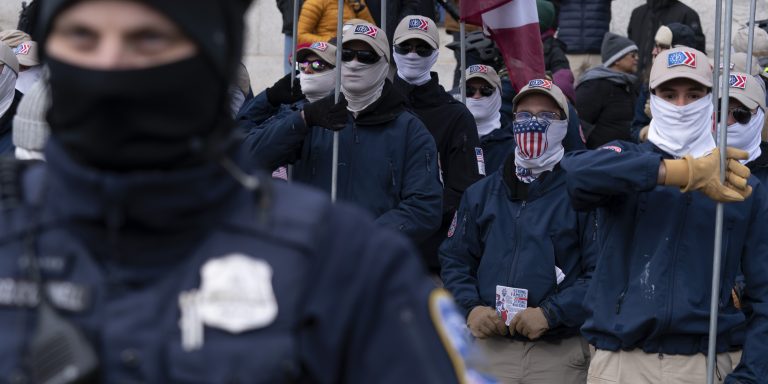INTELBRIEF
June 17, 2022
IntelBrief: Temperature Rising on Ideologically Motivated Violent Extremism

Bottom Line Up Front
- Last weekend’s arrest of 31 members of the white nationalist hate group Patriot Front in Coeur d’Alene, Idaho, is a stark reminder that ideologically motivated violent extremists are broadening their targets.
- In the current political climate, many issues are being viewed through a hyper-partisan lens, including abortion, immigration, election integrity, and gun control, for example
- Online chat rooms and message boards frequented by far-right extremists frequently trade in homophobic and transphobic rhetoric, much of it laced with threats of graphic violence.
- Similar reports of intimidation, harassment, and violence perpetrated by extremists are widespread throughout Europe and elsewhere, reflecting an increasingly international trend.
Last weekend’s arrest of 31 members of the white nationalist hate group Patriot Front in Coeur d’Alene, Idaho, is a stark reminder that ideologically motivated violent extremists are broadening their targets beyond race and ethnicity. The Patriot Front members, clad in matching balaclavas and equipped with shields, shin guards, and smoke grenades, were planning to cause a riot at the LGBTQ+ parade in northern Idaho. Luckily, a concerned citizen saw them loading into the back of a U-Haul truck and alerted police. Those arrested came from twelve different states, suggesting a high degree of preparation and planning. The individuals, including the group’s founder, were arrested, and charged with conspiracy to riot. Patriot Front, a group established in 2017, promotes fascism and the formation of a white ethno-state and has links to the Charlottesville ‘Unite the Right’ rally which took place in August 2017. LGBTQ+ rights, and transgender issues in particular, are becoming a more frequent target of far-right extremists and with Pride parades planned across the country throughout the month of June, there are growing concerns about the security and safety at these events.
In the current political climate, many issues are being viewed through a hyper-partisan lens, including abortion, immigration, elections, and gun control, for example. There is no shortage of topics for Americans to argue over, both at protests and demonstrations, but also online, where a growing ecosystem of hate and racist rhetoric is thriving, most notably in an enabling environment that was created as political leaders adopted more hyper-partisan rhetoric over the past few years. Within the far-right and alt-right spheres, there are myriad ideological issues that are being used by violent extremists to foment division and conflict, with a particular focus on gender, sexuality, and reproductive rights. Research has shown that misogyny, toxic notions of masculinity and in many places, structural inequalities have been used by violent groups to recruit and mobilize support, highlighted by a recent report from the UN Security Council Counter-Terrorism Executive Directorate (CTED) and the International Peace Institute. However, LGBTQ + individuals are not just the target of far-right extremists. Six years ago this month, Omar Mateen, the terrorist inspired by Islamic State, perpetrated a massacre at Pulse Nightclub, a gay venue in Orlando, Florida, where he killed 49 people and wounded 53 others. In July 2020, Mohiussunnath Chowdhury was found guilty of planning terrorist attacks against a Gay Pride march in central London. More broadly across the United Kingdom, crimes based on sexual orientation and gender identity have increased nearly every year since 2015.
Online chat rooms and message boards frequented by far-right extremists frequently trade in homophobic and transphobic rhetoric, much of it laced with threats of graphic violence. According to the Southern Poverty Law Center, in 2021 there were approximately 65 hate groups strictly dedicated to an anti-LGBTQ ideology located in the United States Many of these groups were associated with a church and have cloaked themselves in religious rhetoric, adopting names like “Warriors of Christ” to justify and legitimize their actions, a trend common among groups driven by religious rhetoric. The most infamous is the Westboro Baptist Church in Kansas, known for protesting at the funerals of deceased U.S. servicemembers. Adopting extreme anti-LGBTQ + rhetoric is one way that far-right extremist groups attempt to “broaden the tent,” using contentious topics to recruit new members. Homophobia, transphobia, and misogyny can all serve as conveyor belts toward far-right violent extremism, which is primarily characterized by white supremacist, neo-Nazi, or anti-government and anti-authority beliefs. Moreover, far-right extremist propaganda frequently denigrates anti-fascists and far-left extremists by referring to them in vulgar terms and the mainstreaming of anti-LGBTQ + rhetoric through dangerous “grooming” narratives and a raft of “Don’t Say Gay” bills all contribute to an increasingly alarming climate for LGBTQ + rights which is likely to heat up as Americans head to vote in November.
Beyond the United States, similar reports of intimidation, harassment, and violence perpetrated by extremists throughout Europe and elsewhere indicate a broadly international trend. As Covid-19 restrictions continue to be lifted, there will likely be more events taking place that could serve as soft targets for terrorist attacks. Counterterrorism officials, already focused on the protection of soft targets and critical infrastructure worldwide need to include in their approaches the importance of special events protections to prevent incidents like the recent one in Coeur d’Alene. Along with anti-LGBTQ + rhetoric, abortion, and immigration are likely to become more important accelerants of far-right extremist rhetoric and may even find receptive audiences in supporters of a wide range of violent extremist groups, which could in turn result in more hate fueled violence and a challenge to hard won rights.